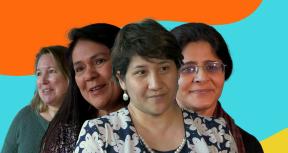TWEET THIS
It was useful to have everyone in the same room, listen to each other, and understand which issues are shareholder concerns across the globe, and which have a more regional focus. I believe for the shareholders it was interesting to hear about evaluation insights from the different institutions.
In the margins of the IMF’s and World Bank Group’s Spring Meetings, a historic meeting took place. Chairs and vice-chairs of the committees overseeing evaluation functions at the international finance institutions got together to discuss how they can promote learning and shareholder coherence across their institutions.
The international finance institutions – the World Bank Group, regional development banks, and the IMF – have the same shareholders with some variations. For instance, World Bank Group shareholders include 189 countries, while the regional development banks have more limited shareholding. Each of them discuss, either in the full executive board or in one of its committees, the findings of independent evaluations. These reports aim to help shareholders hold the international finance institutions accountable to their shareholders and promote learning so that they can provide strategic guidance to the management of these institutions.
So why was this meeting historic?
Even though there are a lot of common shareholders across these institutions, and even though they fulfill a very similar role, exchanges among them are limited. Some of the shareholders exercise coordination through their own capitals— for example, the responsible ministry in France that deals with all the international finance institutions would ensure coherence on its position across the institutions.
It is the mix of shareholders, and their conversations, that make a very important and interesting difference. And this can lead to a lack of coherence across institutions, while certainly a mechanism to learn from each other is missing. In that sense, this was the first time they came together in this way as a group.
How did it come about?
It was the Evaluation Cooperation Group that proposed organizing the meeting. This group meets regularly to exchange insights from evaluations and discuss ways to harmonize evaluation methods. Since 2015, we had floated the idea of getting the chairs of our respective committees together to expand the conversation. But, it was important for the board members to “own” the meeting and see its value; something we achieved this year.
So, what?
As it was a first-time meeting, there was a lot to learn. For one, it was useful to have everyone in the same room, listen to each other, and understand which issues are shareholder concerns across the globe, and which have a more regional focus.
I believe for the shareholders it was interesting to hear about evaluation insights from the different institutions. The theme – shared prosperity and inequality in a fractured world – inspired many diverse inputs. We had not rehearsed as the Evaluation Cooperation Group, hence were not able to shape our presentations in a cohesive way, or lead them to some shared conclusions on similar or divergent findings— this is something for the next round to do. The experience certainly will help us synthesize insights across institutions and look for patterns from our respective work. In the medium-term, it might even lead to better coordinated work programs so that certain topics are dealt with in parallel, as well as common methodological approaches.
In addition, the timing and venue were chosen carefully and deliberately. Bringing together this group of high-level shareholders in the margins of the World Bank Group Spring Meetings enabled them to participate – as panelists or in the audience – in the many exciting and informative sessions that are organized at this time. This was a genuine opportunity to learn more about each other’s institutions, as well as from an outstanding program of seminars. My recommendation: keep it this way and organize the next meeting in the margins of the Annual Meetings of the next host.
Overall, this event was a small, but potentially significant, step in the right direction towards global learning and promoting shareholder coherence on important issues of development effectiveness.








Add new comment